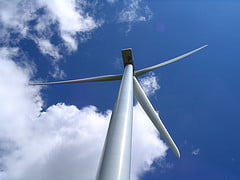

Environment
National Trust chairman slates wind power
Sir Simon Jenkins has criticised wind power as being the “least efficient” of all renewable technologies. However, there is no substitute for sustainability. Alex Blackburne discovers the National Trust’s official standpoint.
Sir Simon Jenkins rattled a few cages over the weekend, when he called wind power the “least efficient” form of renewable energy.
Sir Simon Jenkins has criticised wind power as being the “least efficient” of all renewable technologies. However, there is no substitute for sustainability. Alex Blackburne discovers the National Trust’s official standpoint.
Sir Simon Jenkins rattled a few cages over the weekend, when he called wind power the “least efficient” form of renewable energy.
His comments were duly lapped up by the notoriously anti-wind newspaper, the Daily Telegraph, in an article entitled “National Trust comes out against ‘public menace’ of wind farms”.
The negative nature of the story undermines the positive work that the Trust does by using a badly researched blanket argument. Sir Simon uses questions over the efficiency of wind energy to mask his views on the turbines blighting England’s green hills.
“We are doing masses of renewables but wind is probably the least efficient and wrecks the countryside and the National Trust is about preserving the countryside”, he said.
The real argument then is not really about inefficiency, but how wind farms may damage the view from a stately home or stretch of countryside. Interestingly, there is no mention of the damage that non-renewable energy sources cause to the environment and future. Taking a longer term view, if we carry on using up fossil fuels at the current rate, there may not be any countryside to preserve. And if there is will it instead be blighted by open cast coal mines and cooling towers?
Whatever the typical turbine efficiency, wind is arguably the most readily available form of renewable energy in the UK and offers a wholly sustainable solution.
“Discussing the efficiency of renewable resources is nearly meaningless“, said Dr Matthias Fripp, NextEra Energy Resources research fellow in renewable energy at Oxford University’s Environmental Change Institute.
“What matters is the cost per unit of electricity produced, the times when electricity is produced and the environmental impacts of each power source“.
Notably, the National Trust’s official line is more carefully tempered. Peter Nixon, director of conservation, said, “We have a duty to protect beautiful places, and believe that any wind energy proposals should be located, designed and on a scale that avoids compromising these”.
A simple solution to the Trust’s mantra is offshore wind farms. In fact, harnessing just 29% of the UK’s offshore wind capability would meet all of our energy needs. No more pollution, no more waste – just 100% clean energy.
Unlike the seemingly brash views of Sir Simon, the National Trust does actually include wind technology in its future energy mix.
“We believe strongly in the need to grow renewable energy generation and wean ourselves off fossil fuels”, Dixon added.
“We have a target to generate 50% of our own energy from renewables by 2020, including wind where it is not too large [sic] for its setting.
“We’re trying to show how this can be done without putting at risk our beautiful natural and built heritage.”
Sir Simon’s “not in my backyard” attitude to wind is thankfully not a widely held view, but is often echoed by the misleadingly-named Renewable Energy Foundation. Originally chaired by TV celebrity and anti-wind farm campaigner Noel Edmonds, REF is a registered charity claiming to promote sustainable development with a thinly veiled hidden agenda.
New energy secretary Ed Davey fully supports the sector.
“Britain has a lot to be proud of in our growing offshore wind sector”, he said at the opening of the world’s biggest offshore wind farm off the Cumbrian coast last week.
“Our island’s tremendous natural resource, our research base and a proud history of engineering make this the number one destination for investment in offshore wind.”
To the naysayers, ugly or inefficient seem inappropriate words to describe an innovatively designed piece of machinery that constantly produce clean energy in a wholly sustainable fashion. Efficiency is something that can be improved upon with engineering improvements and support from investors. The question should be how sustainable our energy sources, not how efficient.
If you share Blue & Green Tomorrow’s view, then do something to help out the environment. Get in touch with Good Energy, the UK’s only 100% renewable electricity provider, who can assist you in making your home green.
Related article:


 Environment12 months ago
Environment12 months agoAre Polymer Banknotes: an Eco-Friendly Trend or a Groundswell?

 Features11 months ago
Features11 months agoEco-Friendly Cryptocurrencies: Sustainable Investment Choices

 Features12 months ago
Features12 months agoEco-Friendly Crypto Traders Must Find the Right Exchange

 Energy11 months ago
Energy11 months agoThe Growing Role of Solar Panels in Ireland’s Energy Future





























